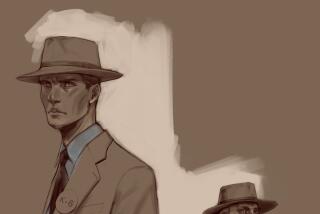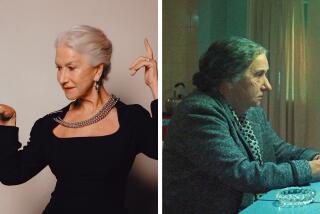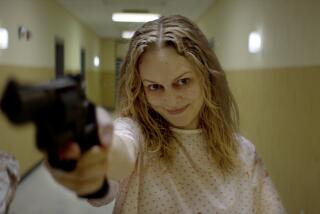Helen Mirren welcomes the Time’s Up movement and the anti-gun vibe of horror film ‘Winchester’
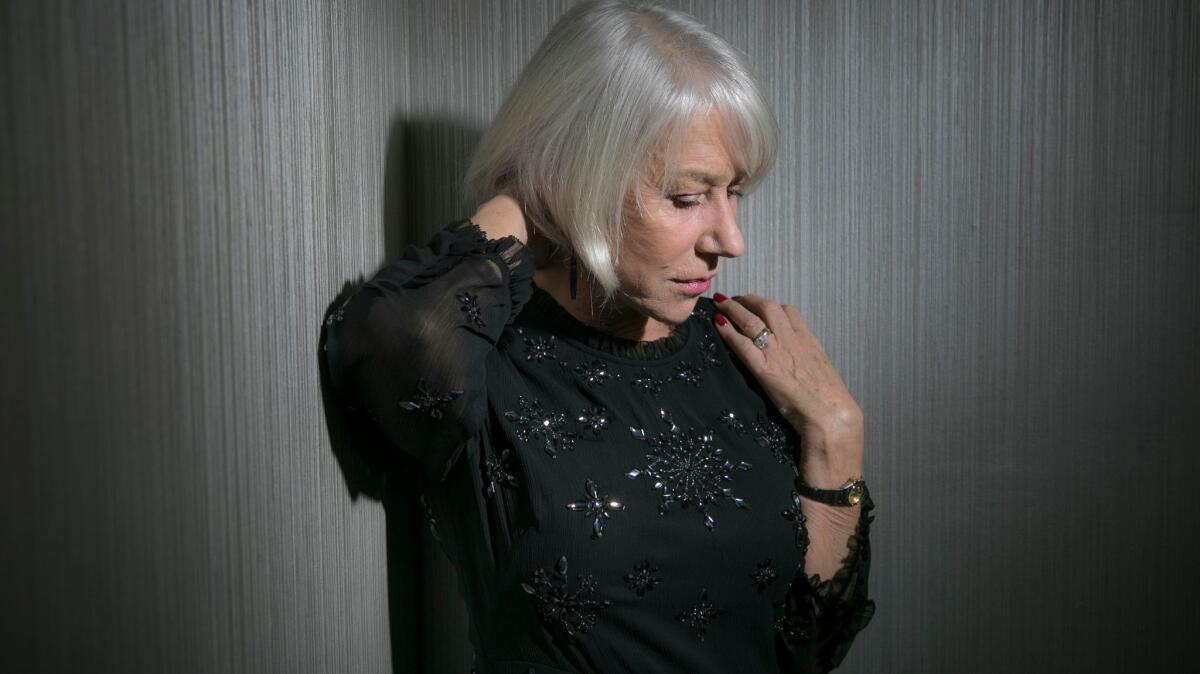
On a bright Los Angeles morning a few days after the Golden Globes, Helen Mirren — dressed impeccably in black while discussing her latest film, the haunted-house tale “Winchester” — arrived at an unexpected concern: the fate of all those poor Stormtroopers in the “Star Wars” movies.
“I saw [‘The Force Awakens’] and I thought they made a terrible mistake because they took the Stormtrooper’s hat off,” the Oscar-winning star of “The Queen” and British national treasure said, feigning shock.
For the record:
12:30 p.m. Jan. 28, 2018An earlier version of this story said that Harvey Weinstein had guided the campaign for Helen Mirren’s 2007 Oscar win for “The Queen.” But Weinstein had left Miramax, which distributed “The Queen,” by the time the film was officially acquired by the company in October 2005.
“There was this lovely young actor [John Boyega] — which means one of the Stormtroopers is a human being. And if he’s a human, they’re all human. And you have been indiscriminately killing Stormtroopers for the last [six] ‘Star Wars’ movies without any consideration to their humanity!”
Themes of violence, death and how those in the world of the living come to terms with their role in it all run throughout the otherwise titillating frights of “Winchester,” a supernatural horror film based on the real widowed heir to the Winchester rifle fortune. Opening Feb. 2, the CBS Films/Lionsgate release is directed by Peter Spierig and Michael Spierig (a.k.a. the Spierig brothers), whose cult-favorite genre work includes “Daybreakers” and “Predestination.”

A cult figure of her own among haunted-house enthusiasts, Sarah Winchester spent 38 years and millions of dollars building her famously bizarre Victorian mansion in San Jose at the turn of the 20th century. Urban legend says she was guided in her blueprints by spirits who spoke to her from the beyond.
As Winchester, who lost her husband and young child at an early age, Mirren spends the film in black widow’s lace. It’s an intriguing turn for one of the most respected grand dames of stage and screen — and also perfectly fitting given the ways Mirren has sought to defy expectations over a five-decade career.
Few moviegoers would expect to see Helen Mirren possessed by malevolent ghosts in a mainstream PG-13 horror movie. Costar Jason Clarke, who plays a (fictional) doctor hired by the Winchester board to declare Sarah Winchester unfit to hold her shares in the company, certainly didn’t.
“But,” he said, “I was happy to be there to see it. There’s this sense of exploration and play in how she plays a scene and a character, and the choices that she makes. There’s nothing scared about Helen Mirren, and you see that in the way she goes about her life.”
In one action-packed scene in which their characters face off against dark forces inside Winchester’s sprawling, forbidding home, the actors agreed to go for it and play it big.
We were in a ghost story acting big and pretending to hear spirits and voices and she just goes, yeah – ‘We’re doing Shakespeare.’ Right on, Helen.
— Jason Clarke
“We were both nervous about whether it was too over the top, but then she grabbed me by the arm and said, ‘I didn’t play Phèdre three times for nothing, dear.’
“She is Helen Mirren. She was Cleopatra. She was Phèdre. And that was how she characterized it,” Clarke said with a laugh. “We were in a ghost story acting big and pretending to hear spirits and voices and she just goes, yeah – ‘We’re doing Shakespeare.’ Right on, Helen.”
That confidence wasn’t always so rock-solid, Mirren revealed.
“I think the early 20s are a very difficult time because you’re through the period of youthful ambition and then you hit reality and you realize, maybe it won’t all be fantastic,” said Mirren. “ ‘Maybe I suck, maybe I’m a bad actress, maybe it’s never going to happen.’ In my early 20s, I was very frightened about the future and about life in general.”
First she went to a psychologist. Then she went to a psychic. He instructed her to write down everything he said as he read her palm. Writing so fast the words barely registered, she walked away holding her own fortunes foretold in her hands.
“I looked at the sheaf of papers and realized in this moment that I didn’t want to know what’s in my future. I want it to be an adventure and a mystery. I want to play it my own way. And I went up to the first rubbish bin I could find,” she smiled, “and I threw my future away.”
The one prediction she remembered him sharing was that she wouldn’t find success until her later years. “Of course, when you’re 22 you so don’t want to hear that,” she said with a grin. “But you know, he was absolutely correct.”
Mirren might not fully believe in the supernatural, but she did find herself communing with the late Winchester while gazing upon one of the most intriguing pieces of the estate the woman had so meticulously built.
“In the house are these two beautiful stained glass panels with quotes from Shakespeare on them,” she said of the twin windows inscribed with lines from “Troilus and Cressida” and “Richard II.” “‘Wide unclasp the tables of their thoughts’ and ‘These same thoughts people this little world.’”
She leaned back, marveling. “Two quotes from two different plays that fit together, but the meaning is so mysterious. I looked at that endlessly trying to think, ‘What is she saying?’ And I think she’s talking about freedom of thought, that people should be able to think whatever they want.”
As for what attracted her to a film in the horror genre — at a time before the mega-success of “Get Out” and “It” repopularized the medium with audiences — Mirren pointed to the conscience behind Winchester’s tragic obsession.
“I think it is legitimate to say that there was a sensitivity to the deaths of the people who died by the Winchester gun,” mused Mirren. “The world is a terrifying place, and a lot of the terror in the world comes from arms in one sort or another, and the sale of arms. And that’s what I really like about the underlying story of the film – her guilt and her pain.”
Mirren cited a moment in the film where Winchester slams the most “unconscionable” part of the gun trade. “She’s not talking about people who use them,” said Mirren. “She’s talking about the people who make them and sell them. Every country in the world is culpable in that.”
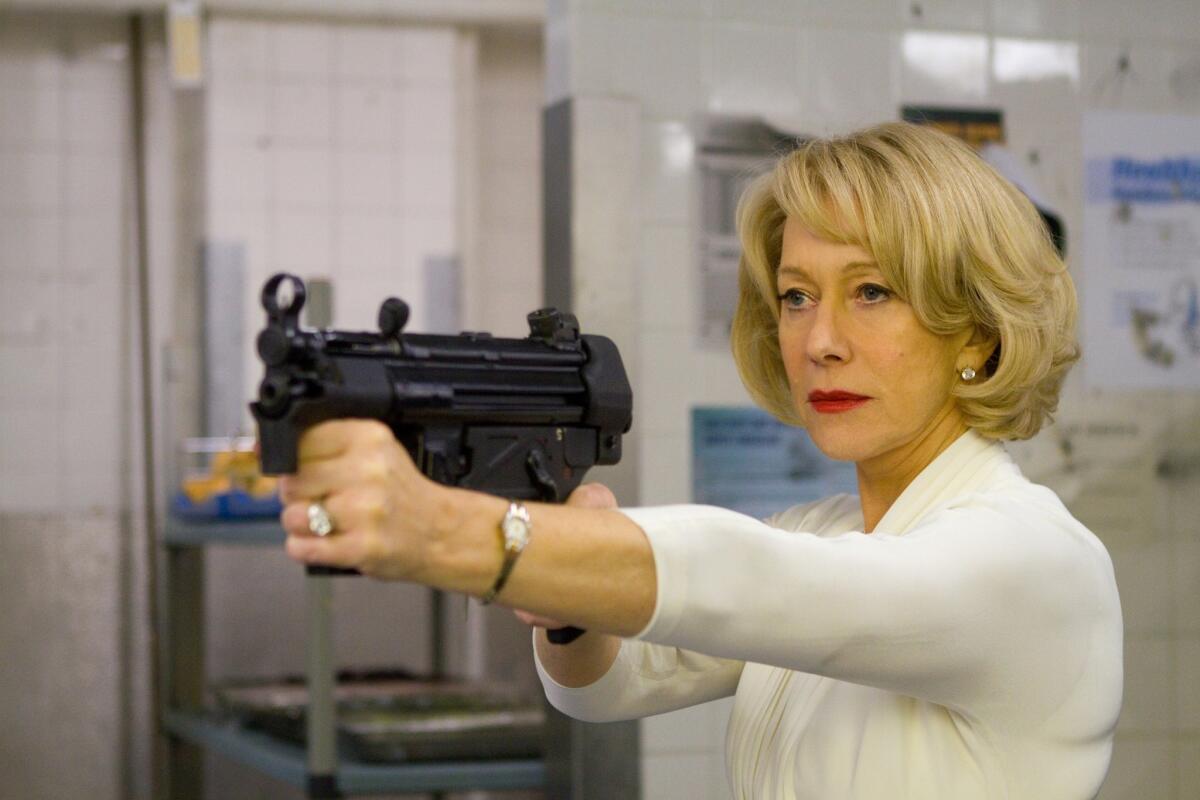
The actress also considered her own culpability in the glamorization of violence.
“It’s always worried me,” she admitted. “In ‘Red’ I played a sniper. I fired every kind of gun on the planet including a Gatling. The thing that upsets me in movies is when the baddies all just get slaughtered. I always watch going, ‘He’s got children! Maybe he’s only there because he’s got a second mortgage and his wife’s got a terrible disease and he’s trying to pay her medical bills!’”
Which is what brought her to the aforementioned subject of Stormtroopers and complex moral interrogations in the “Star Wars” galaxy.
“Who are they? Why are they there?” Mirren considered, half-joking, of the dark side’s most expendable minions. “We only know that we’re on the light side if we win. Everybody thinks they’re the hero of their own story. But, also: History says the winner gets to write the history.”
Earlier in January Mirren took part in an overdue moment in Hollywood history when, appearing as a presenter and nominee at the 75th Golden Globes, she joined a wave of celebrities in wearing black as a sign of solidarity with her fellow women and the Time’s Up movement.
“It was a great year to be nominated and in that room,” said Mirren, who earned her 15th Golden Globes nod for an awards-qualifying run of the upcoming release “The Leisure Seeker.” “It was pretty historic. The best thing about it was that it was very positive. Often, people are criticized for using that situation as a platform for any political statement whatsoever, but that night it was like, ‘This is what we’re all here for.’ I was proud of women and I was proud of my industry to a certain extent.”
In 1975, as a rising star on the London stage and member of the Royal Shakespeare Company, Mirren infamously endured the sexist panderings of Brit interviewer Michael Parkinson on his talk show. When the interview resurfaced in the age of YouTube, footage of the young Mirren firing back went viral, lending her long-overdue support from a contemporary public.
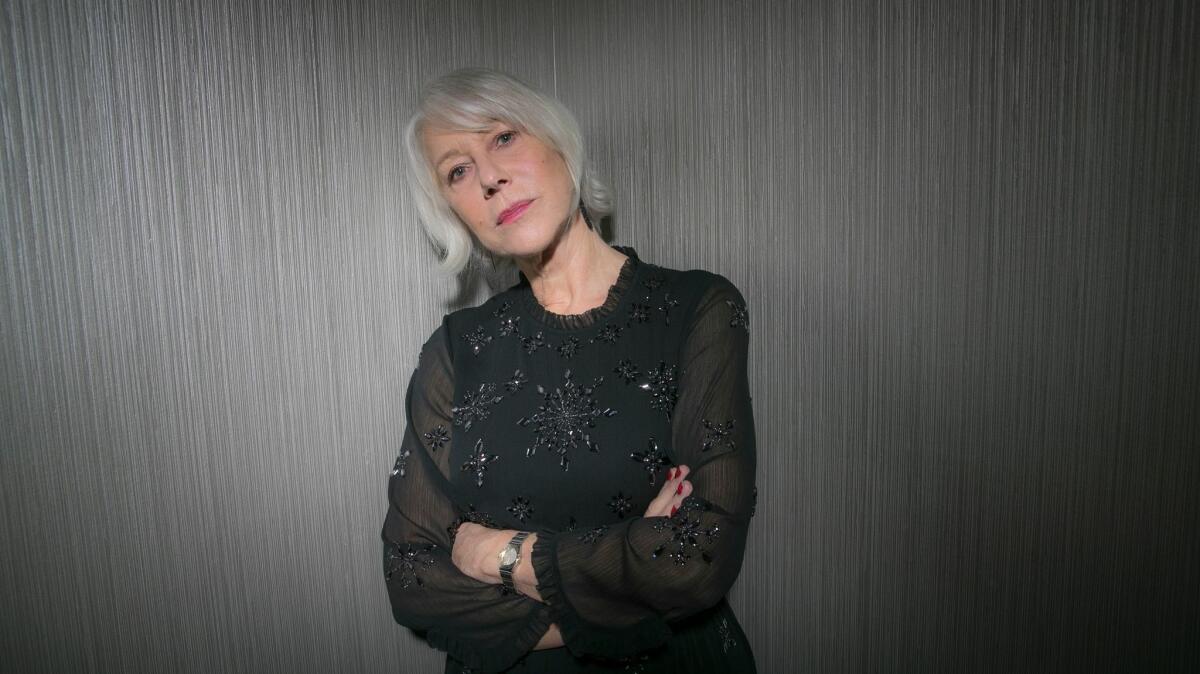
I want people to unpick it, to expose the behavior, and now begin to expose why. I think it’s fantastic that it’s been exposed.
— Helen Mirren on sexual assault and harassment
This year Mirren has been excited to see Hollywood’s #MeToo and Time’s Up movements force change in how the entertainment industry confronts sexual harassment and abuse — a cultural shift sparked by accusations against alleged serial abuser Harvey Weinstein, who ran the Weinstein Co.’s 2015 awards campaign for her film “Woman in Gold.” (He had left Miramax by the time the company was backing her 2007 Oscar win for “The Queen.”)
“The first time I worked with him and his brother was when they distributed a film I did called ‘The Cook, the Thief, His Wife, and Her Lover,’ which was an art movie and which normally would have never gotten distribution in America — but the Weinstein brothers distributed it, and a lot of filmmakers have a lot to be grateful to the Weinstein brothers for that very reason, especially in independent film. So that’s one side of it,” said Mirren.
She paused. “You have this other side. It’s so confusing, and so upsetting, and so annoying — especially annoying,” she said. “And also utterly mysterious to me because it’s clearly nothing about sex — what could be less sexy than the stories one has been reading in the papers? — and obviously completely to do with power.
“[Weinstein’s alleged abuses were] something I would have bet $5,000 wasn’t happening,” she continued. “I thought we’d gone way beyond that. I would have believed it 30 years ago. I thought ‘no, no way – we’re way beyond that.’”
She says she hopes that the world will follow Hollywood’s lead and make Time’s Up a global movement.
“I want people to unpick it, to expose the behavior, and now begin to expose why. I think it’s fantastic that it’s been exposed,” she said, firmly. “For me it’s about time, rather than Time’s Up, but it comes to the same thing — time’s up.”
More to Read
Only good movies
Get the Indie Focus newsletter, Mark Olsen's weekly guide to the world of cinema.
You may occasionally receive promotional content from the Los Angeles Times.
